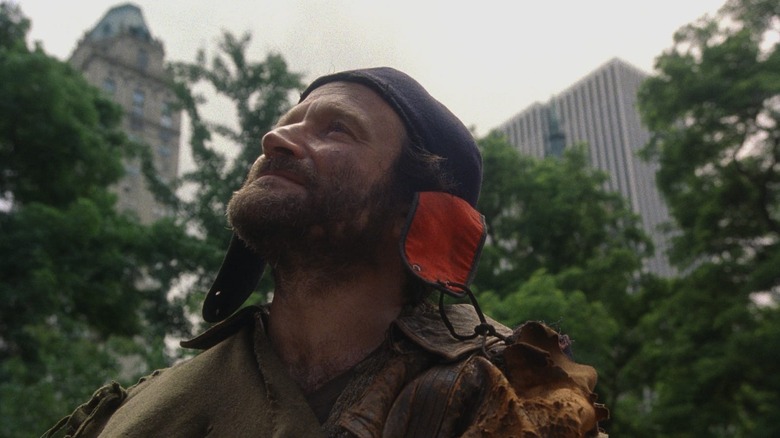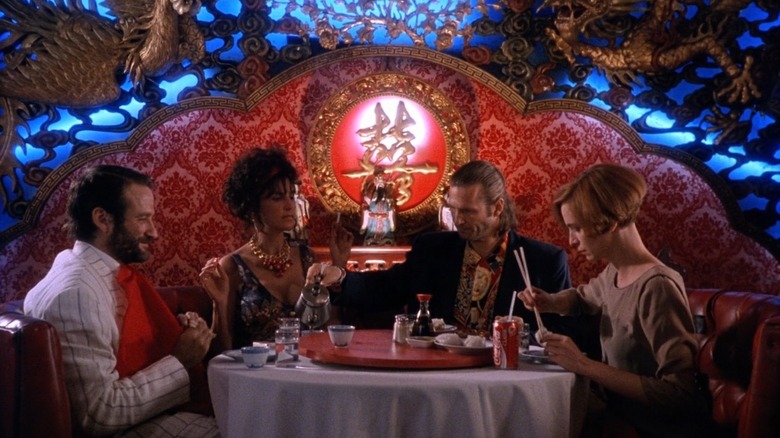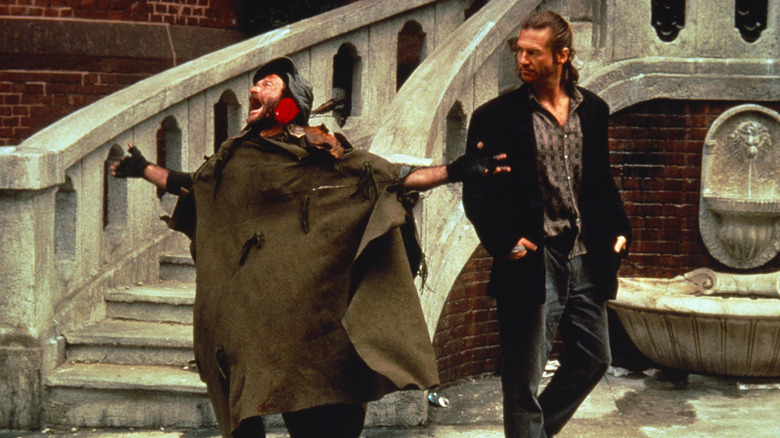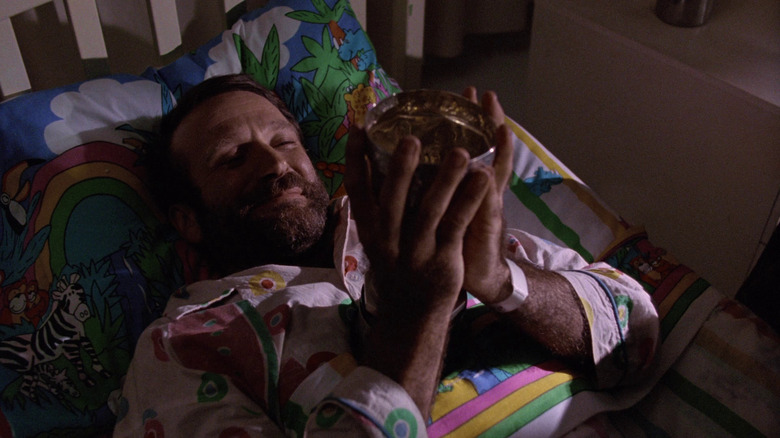One Scene In The Fisher King Pushed Robin Williams To His Limits
"The Fisher King" has always been my favorite Terry Gilliam movie, but I only saw it again recently for the first time since its star, Robin Williams, died so tragically in 2014. I guess what kept me away for so long was the feeling that, given that some of its themes are so closely linked to depression, mental illness, and suicide, it might feel a little too close to the bone, or even intrusive.
To someone who hasn't seen "The Fisher King" before, that might make it sound like a film worth approaching with caution. While it goes to some painful places, Gilliam pulls off a masterful balancing act, illuminating the darkness with captivating flights of fancy, uplifting performances, and heartfelt comedy. For a director usually more interested in wild visuals, he produces the most mature and complex work of his career, creating a very human film with an astonishing amount of heart.
Williams is central to the film's warmth and generosity of spirit. I've watched it probably a dozen times over the years, but this time I saw his performance differently. I used to get irritated by his motormouth shtick in the early scenes, but now, armed with hindsight, it's easy to interpret that as a front to hide his very real anxiety and pain, much as his character does in the film. Later scenes where the trauma bubbles to the surface were always disturbing, but they feel especially raw now. As Gilliam discovered, those moments came from a place deep within the actor.
So what happens in The Fisher King again?
New York shock jock Jack Lucas (Jeff Bridges) isn't a very nice guy. Egotistical and selfish, he takes to the air every morning to tear apart his callers and pry into celebrity sleaze. His show is a hit, and that's when TV beckons. However, all that is thrown into upheaval when a disturbed regular listener takes his outrageous comments too literally and goes on a killing spree with a shotgun in a trendy Manhattan eatery.
Three years later, Jack has hit the bottle and quit his wealthy showbiz lifestyle out of guilt, mooching around in a shabby video rental store where he works for his big-hearted girlfriend, Anne (Mercedes Reuhl). One night, Jack gets exceptionally drunk, depressed and full of self-loathing, he prepares to throw himself in the Hudson river. Before he can make up his mind he's attacked by two young thugs, who try to burn him alive. Luckily, he is rescued by Parry (Williams), a crusading homeless person and his band of friends.
Parry tells Jack that he's on a quest for the Holy Grail, but he can't retrieve it because he is terrified of the fearsome Red Knight, a hallucinatory spectre that menaces him whenever reality intrudes on his delusions. Jack learns that Parry was formerly a college tutor who was in the restaurant the night of the shooting, and Parry's wife was one of the victims. Feeling responsible, Jack helps Parry woo Lydia (Amanda Plummer), a mousy office worker he has a crush on, and reluctantly finds himself drawn into the modern knight errant's grail quest.
Does The Fisher King still hold up?
"The Fisher King" is a unique entry in Gilliam's filmography, made as a lowkey project after the critical and commercial disaster of "The Adventures of Baron Munchausen." While it still has plenty of fantastical elements, it is mainly an intimate relationship movie built around four outstanding performances from Bridges, Williams, Reuhl, and Plummer, with a memorable showstopper of a supporting role from Michael Jeter.
Naturally, Terry Gilliam can't resist his usual visual flourishes, so we also have a fire-spewing Red Knight and an unabashedly romantic waltz through Grand Central Station, and the film looks stunning. Gilliam transforms New York into a fairytale kingdom, turning the skyline into castle ramparts, streets into chasms, and the bottom floors of skyscrapers into the roots of giant trees.
Richard LaGravenese's rich screenplay gives the actors plenty to get their chops into as well. Reuhl won the Oscar for Best Supporting Actress and Williams was nominated for Best Actor, while Bridges was inexplicably snubbed. That's a travesty, because he grounds the whole movie with a display of incredible breadth and subtlety, arguably the best performance of his career. The Academy are usually attracted to the showier roles, after all, but Bridges still ended up winning an Oscar for his turn in "Crazy Heart" in 2010.
I don't say that to knock Williams' performance, because I absolutely love him in this movie. His role is a showcase for his full range of acting styles, from the quickfire riffing and improvisation that would make "Aladdin" such a huge success, to the more considered approach that won his only Oscar for "Good Will Hunting." Yet one scene almost pushed him almost to his limit.
The scene that took Robin Williams to his limit
Terry Gilliam was shooting the key scene where, after a successful double-date, the buried trauma of Parry's wife's murder fully emerges. He breaks down and flees, pursued by the terrifying vision of the Red Knight. GIlliam said (via Vulture):
"It was very hard from an acting point of view, because Robin was tearing his guts out emotionally. The interesting thing about Robin in all of those scenes was that he always wanted to do another take. He felt he had even more anguish and pain to spill out of the character. And I had to really stop him. I had to say, 'Robin, you've reached a point here, way beyond what we expected. We've got what we needed. Now you're just hurting yourself.'"
Gilliam revealed that no one in the crew wanted to approach the actor when he got himself worked up into such a state of madness, and the director needed to comfort him and reassure him that the performance was up to par. Gilliam continued:
"But that's what was so extraordinary about him — how he would commit everything and more to what he had to do. That's also why I think his character in "The Fisher King" is in many ways the closest one to Robin, just that range — the madness, the damage, the pain, the sweetness, the outrageousness. That was the role I think that stretched him to the limits."
It's so bittersweet watching him again in the film, bringing so much life and vivacity to the role of a man suffering mental illness, who manages to conquer his demons. Sadly, back in the real world, Williams himself couldn't quite escape the darkness.



